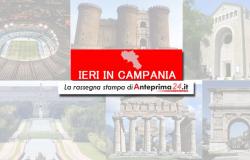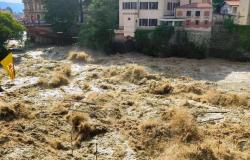On August 20th at 9.30pm at the Galli Theater in Rimini the theater show “Chi sei tu? The challenge of Jerusalem”, taken from Eric-Emmanuel Schmitt’s travel diary in the Holy Land. Otello Cenci, director of the show and head of the Meeting’s shows, tells us about the genesis of this theatrical project.
It all started from the meeting with Schmitt. An initially remote meeting…
Meeting Eric-Emmanuel Schmitt was a key moment for this project. During a meeting at Meeting 2022, I was struck by his great humanity and I threw myself into an increasingly passionate reading of his texts. Thus, last year, the idea of bringing ‘Monsieur Ibrahim and the flowers of the Koran’ to the stage with Sergio Rubini and Simone Zanchini was born. To prepare for the show, a first long-distance relationship with Eric was born.
And the text on Jerusalem?
We can say that Lorenzo Fazzini, director of the Libreria Editrice Vaticana, was responsible for the unleashing of events. First by inviting Schmitt to go to Jerusalem to write a personal travel diary. Then, last summer, Lorenzo proposed that I read Eric’s text in advance and try to understand if a show could arise from it. I was very struck by the exceptional experience the author had in those very significant and controversial places. Furthermore, courage and great seriousness are needed to publicly share such intimate events and feelings. From this was born the desire to bring it on stage.
Then the meeting in person…
Yes, I met Eric in September in Bologna, on the occasion of the presentation of his book together with Cardinal Matteo Maria Zuppi. The meeting was very pleasant, thanks to his great availability. On that occasion, at the end of the long chat, knowing of his great love for the theater and also of his direct experience in this sector, I proposed to him to represent the text himself. After an initial hesitation, we left with the intention of verifying the effectiveness and value of the adaptation that we would be able to obtain. And today we are here…
What struck you about Schmitt’s text on Jerusalem?
Schmitt faces reality with irony, but never fails to share very personal and profound feelings and judgments. He always follows a lightness of approach with a human in-depth analysis that goes to the heart of the story that is the subject of the story. The view on reality seems to be that of everyone, the one that derives from the mentality of our time, but he manages to see the interesting side that lies behind the difficulties, the angular characters, the dramatic events. His extreme sincerity, spontaneity and courage to recount such exceptional and delicate events, such as, in this case, his experience at the Holy Sepulchre, are rare today.
We are talking about a journey that is also internal.
In his diary Schmitt describes a conversion that occurs in a very human way and that I feel is very close to my sensitivity. He starts from a rationalist attitude, due to his education and training. He has the typical disenchantment of the man of the twenty-first century and he expresses it in a nice way in the description he gives of the encounters with the people and places symbolic of the different religions. However, he does not stop at this first reaction which would lead him, like all of us, to distance himself, but overcomes the embarrassment and skepticism, agreeing to get involved and share the journey to the end, both geographically and personally to find out what there is something true and important in the end for him. His journey can involve the reader and, I hope, also the spectators in a shocking internal journey.
Adapting Schmitt’s text for an 80-minute show is a non-trivial challenge… the original text is very substantial.
We worked carefully to preserve the human and geographical journey without cutting the crucial places visited by Schmitt, trying to safeguard the most dramatic aspects and the encounters that marked the change in him. The first reduction, made together with Emanuele Fant, received a more than positive response from him. Subsequently we worked to further ‘strip down’ the story to make it even more essential. This is how the title of the show emerged, which focuses on the question ‘Who are you?’, the one that Schmitt feels insistently asked by the places he visits and by what happens to him. Who are you? What do you believe in? What do you really consist of? Questions very pertinent to the title of this edition of the Meeting.
Since Schmitt wrote his travel diary, a terrible conflict has broken out in the Land of Christ. How does this work help us to read the situation in those territories?
Éric observes in his text that Jerusalem is a jumble of different styles and architecture. Then, poetically, he observes that perhaps the stones can coexist harmoniously because they have recognized and accepted that they are made of the same material. “This,” he writes, “is a step that man has yet to take.” The show obviously does not have the ambition to say who is right in this dramatic and bloody war that fuels hatred throughout the world, but it aims to provoke the public through Éric’s story, to a fully human look at us themselves and others, whoever they are.





